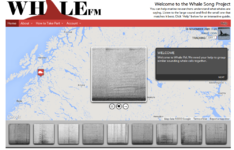WhaleFM
Cs Portal > List of citizen science projects > Whale FM - (2013/10/14)
IDENTIFICATION
- Beta start date : N/A
- End date : Still open.
- Natural sciences > Oceanography (nature/conservation)
- Others in the same subject areas: Air Quality with Biomarkers, Andromeda Project, Bat detective, Budburst... further results
- Others projects about nature/conservation: Air Quality with Biomarkers, Bat detective, Celebrate Urban Birds, Evolution MegaLab... further results
⇳ Description [[Has project description::The WhaleFM project ask participants to help classifying calls of Whales, i.e. find close matching pairs of calls.
According to Mariette DiChristina, Whale.FM—a collaborative effort of Scientific American, Zooniverse and the research institutions WHOI, TNO, the University of Oxford and SMRU—lets citizen scientists help marine researchers who are studying what whales are saying.]] ➠ Purpose [[Has project purpose::Different international research projects have been set up to address several of these issues by studying the effect of sound on the behavior of marine mammals. The aim of such ‘behavioral response studies’ is to try to understand how and why marine mammals respond to various sound stimuli. These studies are badly needed in order to establish regulations and guidelines to mitigate the impact of man-made sound on marine life.
Many of the sounds that you will hear in this project have been recorded during such behavioral response studies. In these experiments, the effect of sonar sound on killer whales and pilot whales is studied. What we find is that killer whales and pilot whales respond to sonar sounds amongst others by changing the calls that they make.
The communication of killer whales and pilot whales is still poorly understood. While we know for some species the general context in which sounds are made (reproduction, contact calls for finding each other) many of the calls remain a mystery to us. To properly understand the implications of these responses, we need to know more about why and when animals make specific calls. This process is very challenging especially for vocal species such as killer whales and pilot whales.
Source: Science, retrieved oct. 14 2013]] ? Research question [[Has research question::According to the Science page]], (retrieved oct. 14 2013), the dataset generated by this project will allow us to address interesting questions, such as:
- How well do different judgements of volunteers agree, and how well can we categorize calls of vocal species such as pilot whales?
- How large is the call repertoire of pilot whales? (is size repertoire sign of intelligence?)
- Do the long and short finned pilot whales have different call repertoires (or ‘dialects’?)
TEAM
Project team page scientificamerican.com Leader: Peter Tyack, Scientist Emeritus, Woods Hole Oceanographic Institution Institution: Partner institutions: Contact: Sander von Benda-Beckmann sander.vonbendabeckmann@tno.nl
USER TASKS
CONTRIBUTION TYPE: data interpretation
PARTICIPATION TYPOLOGY:
GAMING GENRE NONE
GAMING ELEMENTS: NONE
◉ Tasks description Participants have to identify matching calls of Pilot and Killer Whales. They can look at spectograms and also listen to sound. A series of whales were tagged with an audio device that records calls and position. ⤯ Interaction with objects Participant has to select spectogram pictures, can listen to associated sound and tick if it seems to be matching a given spectogram. A selected item then must be compared again before the user can click "Match".
It is possible to follow the same Whale.
Each call can be discussed in a contextualized forum ▣ Interface
- Data type to manipulate: sound, other
- interface enjoyment:
- Interface usability:
GUIDANCE
- Tutorial: ✓
- Peer to peer guidance: Somewhat
- Training sequence: Somewhat
- Individual performance: Somewhat
- Collective performance: Somewhat
- Research progress: Somewhat
❂ Feedback and guidance description It is possible to see the analyzed calls on a map.
COMMUNITY
- Communication: forum
- Social Network: N/A
- Member profiles:: N/A
- Member profile elements:
- Main news site: http://talk.whale.fm/
- Frequency of project news updates: less than weekly
- Type of events:
- Frequency of events :
⏣ Community description
- Community size (volounteers based)
- Role:
- Interaction form:
- Has official community manager(s): maybe
- Has team work N/A
- Other:
- Community led additions:
Other information
PROJECT
Url:http://whale.fm/
Start date:
End date: Still open
Infrastructure: Zooniverse
TEAM
Official team page:scientificamerican.com
Leader: Peter Tyack, Scientist Emeritus, Woods Hole Oceanographic Institution
Contact: sander.vonbendabeckmann@tno.nl
PROJECT DEFINITION
Subject
Natural sciences > Oceanography (nature/conservation)
Description
The WhaleFM project ask participants to help classifying calls of Whales, i.e. find close matching pairs of calls. According to Mariette DiChristina, Whale.FM—a collaborative effort of Scientific American, Zooniverse and the research institutions WHOI, TNO, the University of Oxford and SMRU—lets citizen scientists help marine researchers who are studying what whales are saying.
Purpose.
Different international research projects have been set up to address several of these issues by studying the effect of sound on the behavior of marine mammals. The aim of such ‘behavioral response studies’ is to try to understand how and why marine mammals respond to various sound stimuli. These studies are badly needed in order to establish regulations and guidelines to mitigate the impact of man-made sound on marine life. Many of the sounds that you will hear in this project have been recorded during such behavioral response studies. In these experiments, the effect of sonar sound on killer whales and pilot whales is studied. What we find is that killer whales and pilot whales respond to sonar sounds amongst others by changing the calls that they make. The communication of killer whales and pilot whales is still poorly understood. While we know for some species the general context in which sounds are made (reproduction, contact calls for finding each other) many of the calls remain a mystery to us. To properly understand the implications of these responses, we need to know more about why and when animals make specific calls. This process is very challenging especially for vocal species such as killer whales and pilot whales. Source: Science, retrieved oct. 14 2013
Research question.
According to the Science page, (retrieved oct. 14 2013), the dataset generated by this project will allow us to address interesting questions, such as:
- How well do different judgements of volunteers agree, and how well can we categorize calls of vocal species such as pilot whales?
- How large is the call repertoire of pilot whales? (is size repertoire sign of intelligence?)
- Do the long and short finned pilot whales have different call repertoires (or ‘dialects’?)
ABOUT PARTICIPANT TASKS
Tasks description.
Participants have to identify matching calls of Pilot and Killer Whales. They can look at spectograms and also listen to sound. A series of whales were tagged with an audio device that records calls and position.
Interaction with system objects.
Participant has to select spectogram pictures, can listen to associated sound and tick if it seems to be matching a given spectogram. A selected item then must be compared again before the user can click "Match". It is possible to follow the same Whale. Each call can be discussed in a contextualized forum
| Grey typology | Participation typology | Contribution type: | ||||||||||||||||||||||||||||
|---|---|---|---|---|---|---|---|---|---|---|---|---|---|---|---|---|---|---|---|---|---|---|---|---|---|---|---|---|---|---|
|
|
|
||||||||||||||||||||||||||||
| Gaming | ||||||||||||||||||||||||||||||
| Genre: | Gaming elements: | |||||||||||||||||||||||||||||
| Interface | ||||||||||||||||||||||||||||||
| Data type to manipulate: sound, other | interface enjoyment: Interface usability: |
Member profiles::N/A Member profile elements: |
||||||||||||||||||||||||||||
ABOUT GUIDANCE AND FEEDBACK
| Guidance | Feedback on | ||||||||||||
|---|---|---|---|---|---|---|---|---|---|---|---|---|---|
|
|
Feedback and guidance description.
It is possible to see the analyzed calls on a map.
COMMUNITY
| Tools | News & Events |
|---|---|
|
Communication: forum |
Main news site: http://talk.whale.fm/ |
| Community description | |
|
Community size (volounteers based): |
|
Other information about community:
Community led additions:
OTHER PROJECT INFORMATION
WhaleFM Home-2013-10-14.png Yes [[has completion level::Low]
scientificamerican.com Sander von Benda-Beckmann
sander.vonbendabeckmann@tno.nl
Yes Oceanography Natural sciences nature/conservation [[Has project purpose::Different international research projects have been set up to address several of these issues by studying the effect of sound on the behavior of marine mammals. The aim of such ‘behavioral response studies’ is to try to understand how and why marine mammals respond to various sound stimuli. These studies are badly needed in order to establish regulations and guidelines to mitigate the impact of man-made sound on marine life.
Many of the sounds that you will hear in this project have been recorded during such behavioral response studies. In these experiments, the effect of sonar sound on killer whales and pilot whales is studied. What we find is that killer whales and pilot whales respond to sonar sounds amongst others by changing the calls that they make.
The communication of killer whales and pilot whales is still poorly understood. While we know for some species the general context in which sounds are made (reproduction, contact calls for finding each other) many of the calls remain a mystery to us. To properly understand the implications of these responses, we need to know more about why and when animals make specific calls. This process is very challenging especially for vocal species such as killer whales and pilot whales.
Source: Science, retrieved oct. 14 2013]] [[Has research question::According to the Science page]], (retrieved oct. 14 2013), the dataset generated by this project will allow us to address interesting questions, such as:
- How well do different judgements of volunteers agree, and how well can we categorize calls of vocal species such as pilot whales?
- How large is the call repertoire of pilot whales? (is size repertoire sign of intelligence?)
- Do the long and short finned pilot whales have different call repertoires (or ‘dialects’?)
Whale FM Participants have to identify matching calls of Pilot and Killer Whales. They can look at spectograms and also listen to sound. A series of whales were tagged with an audio device that records calls and position. data interpretation
sound, other, other: Spectograms
Thinking: yes
Computing: no
Sensing: no
Gaming: no
Participant has to select spectogram pictures, can listen to associated sound and tick if it seems to be matching a given spectogram. A selected item then must be compared again before the user can click "Match".
It is possible to follow the same Whale.
Each call can be discussed in a contextualized forum
yes
N/A
strong
somewhat
N/A
N/A
It is possible to see the analyzed calls on a map.
N/A
maybe forum N/A
less than weekly
N/A
Low
Other stuff ....
Bibliography
| BIBLIOGRAPHY |
The Whale Song Project (Whale FM). Scientific American
The Whale Song Project (Whale FM). Scientific American
Whale.FM: Where Citizen Science, Whale Songs and Education Come Together. Mariette DiChristina
- ➥ http://blogs.scientificamerican.com/at-scientific-american/2012/04/19/whale-fm-where-citizen-science-whale-songs-and-education-come-together/
- 💬 This piece is a recording of a live chat.
Whale.FM: Where Citizen Science, Whale Songs and Education Come Together. Mariette DiChristina
- http://blogs.scientificamerican.com/at-scientific-american/2012/04/19/whale-fm-where-citizen-science-whale-songs-and-education-come-together/
- This piece is a recording of a live chat.
Scientific American launches Citizen Science Whale-Song Project, Whale FM. Scientific American
Scientific American launches Citizen Science Whale-Song Project, Whale FM. Scientific American
.
.



